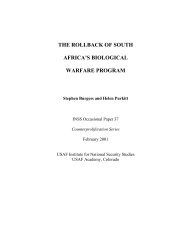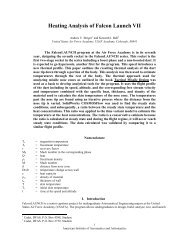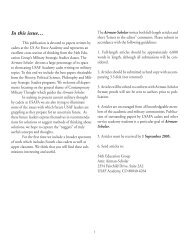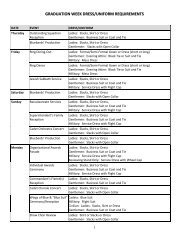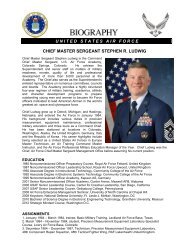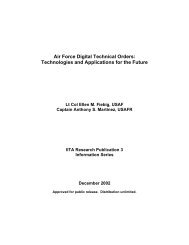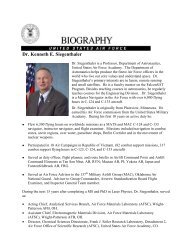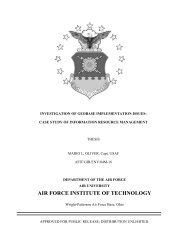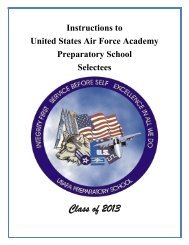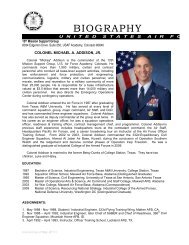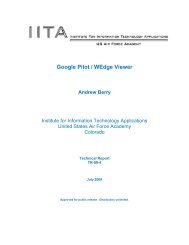Military Professionalism - United States Air Force Academy
Military Professionalism - United States Air Force Academy
Military Professionalism - United States Air Force Academy
You also want an ePaper? Increase the reach of your titles
YUMPU automatically turns print PDFs into web optimized ePapers that Google loves.
soldier: emphasizing physical fitness and endurance, preferring to live rough with his<br />
men, and a master of the topography of battlegrounds. He refused to carry a weapon into<br />
combat, feeling his job was to lead not to fight. (In the U.S. Army, men like Charlie<br />
Beckwith, the founder of Delta <strong>Force</strong>, and Richard Meadows, leader of the Son Tay<br />
Raiders, had similar careers and maintain similar legends.)<br />
Great Britain<br />
“Colonel Ignores Rules for SNP Job.” London, England: The Mirror (Jan. 6, 1999).<br />
Active duty Col. Calamity Crawford gave military advice to active politicians in the SNP.<br />
Col. Calamity opted to retire and enter into politics since military regulations restrict the<br />
involvement of active duty service members in politics. He had to wait three months for<br />
his resignation to come into effect, meaning that he could be court martialed if he advised<br />
politicians during that time period.<br />
Egnell, Robert. “Explaining U.S. and British Performance in Complex<br />
Expeditionary Operations: The Civil-<strong>Military</strong> Dimension.” Journal of Strategic<br />
Studies 29.6 (Dec. 2006): 1041-1075.<br />
A nation's structure and culture of civil-military relations are important and largely<br />
overlooked factors in explaining the performance of armed forces involved in complex<br />
expeditionary operations. The U.S. model of “Huntingtonian,” with its divided civilmilitary<br />
structures and poor interagency cooperation, makes the US military less suited<br />
for complex expeditionary operations. British civil-military relations involve a Defence<br />
Ministry that conscientiously integrates military and civilian personnel, as well as<br />
extensive interagency cooperation and coordination. This “Janowitzean” integrated form<br />
of civil-military relations makes the British military more likely to provide for the<br />
planning and implementation of comprehensive campaigns that employ and coordinate<br />
all instruments of power available to the state, as well as troops in the field displaying the<br />
flexibility and cultural and political understanding that are necessary in complex<br />
expeditionary operations.<br />
Korski, Daniel. “British Civil-<strong>Military</strong> Integration: The History and Next Steps.”<br />
The RUSI Journal 154.6 (Dec. 2009): 14-24.<br />
British campaigns in Iraq and Afghanistan exposed a lack of institutional memory of the<br />
lessons of previous interventions. Twenty-first century security challenges have defied<br />
the traditional organizational boundaries within (and between) the military, civil service<br />
and government. Although there have been efforts to move towards the so-called<br />
comprehensive approach and create truly joint frameworks, the overhaul of government<br />
institutions has not been radical enough. A fresh, bold set of reforms is required to<br />
rework the institutions of state power to be effective in the present security environment.<br />
75




